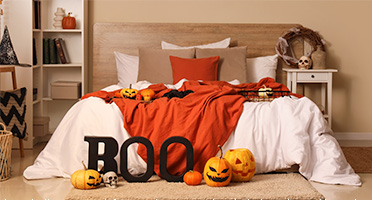Whether you stay home this summer or go on vacation, it is good to know how heat can impact your sleep. Poor sleep can make daytime activities a chore. A foggy head can make it hard for you to do your job, and fatigue during the day can lead to napping, further impacting your ability to sleep at night. This can become a harmful cycle. Traveling in the heat makes things even worse. Let’s look at these summer sleep struggles, explore how to improve your sleep while on vacation, and talk about the condition known as obstructive sleep apnea.

Hot summer days and sleepless nights
The body needs an initial drop in body temperature to prepare for sleep. When it’s too hot, your body will have a harder time with this, and a constant high room temperature can impact deep sleep stages throughout the night. In deep sleep states, brain activity slows, and the body becomes more sensitive to temperature. Your body wants to naturally progress through REM (rapid eye movement), light sleep, and deep sleep in several cycles. Elevated temperatures disrupt this process, reducing the time you spend in deep, restorative sleep stages. Heat can also have an impact on your cardiovascular system, increasing your heart rate and blood pressure. These stresses can add to the challenge.
The impact of longer summer days
Do you know that you have a clock in your brain? Your internal clock helps to control your sleep-wake cycle, and it is impacted by longer daylight hours during the summer months. On top of this, long sunny days and exposure to more natural light delay melatonin secretion. Melatonin signals the body to prepare for sleep. When it is low, you’re likely to get less sleep and wake earlier.
Irregular schedules make sleep challenging
Your body prefers to have a pattern. When the pattern is disturbed by a change in scenery, bedtime environment, or sleep schedule, it can disrupt your sleep long after you return home from vacation. Have you heard of jet lag? You don’t have to take a trip to Australia to get it. You can feel jet lagged by altering your sleep pattern anywhere you go. A change of schedule throws your body off and makes it difficult to maintain stable circadian rhythms.
Travel sleep tips to improve summer vacations
Now that you know the challenges, let’s explore some options to help you get better sleep. It begins with addressing your sleeping environment.
- Sleep in a temperature-controlled room if possible. Maintain a slightly low temperature to help your body enter sleep.
- If you don’t have a temperature-controlled sleeping environment, open some windows to allow airflow and use a fan to cool your body.
- Try taking a lukewarm shower before bed. This will relax you and allow your body temperature to drop as you go to sleep, signaling your body that it is time. Avoid taking a hot shower or bath as these can increase your core body temperature and have the opposite effect.
- Keep the curtains closed to prevent early morning light from waking you. Doing this during the day can also help to keep the heat out.
- Wear a sleep mask to further block out any light that may disrupt your scheduled sleep.
- Maintain proper hydration during the day.
- Attempt to maintain your sleep schedule with an emphasis on maintaining the same wake-up time. Consistent wake-up time positively impacts your circadian rhythm.
Simple steps like these can make a big difference. You may not have the perfect sleeping environment, but every effort you make to support your body’s natural sleep cycle will have an impact.
Signs that you may have sleep apnea
Do you notice that you get horrible sleep during the summer? Noticing increased swelling in your throat? Have family members said you’re snoring louder, or that you suddenly stop snoring for longer periods? If so, you likely have sleep apnea.
These warning signs are something you should heed. Difficulty breathing at night and disrupted sleep will put a strain on your body and can lead to serious medical issues if left unaddressed. Fortunately, there is technology that can help with this disorder. Using a continuous positive airway pressure machine (CPAP) is one way to help you get the sleep your body needs.
Would you like to find out whether or not you have sleep apnea? There is an easy way to do this. Order a sleep test and get the problem diagnosed.
Good sleep is essential for good health in all seasons. Begin to address your sleep issues by considering factors such as long daylight hours, heat exposure, and irregular travel schedules and making simple changes to your routine. To address sleep apnea, we recommend speaking with a professional.






